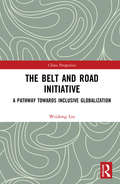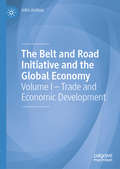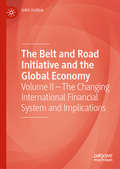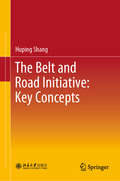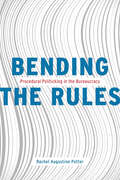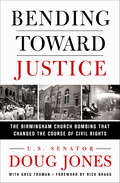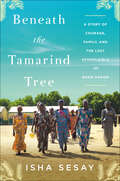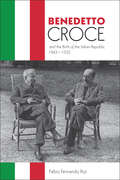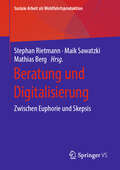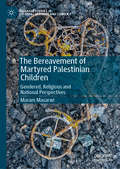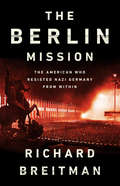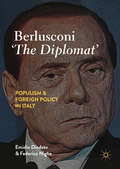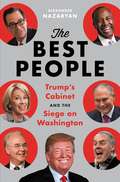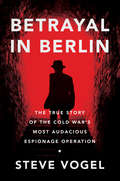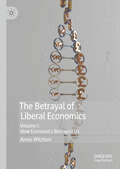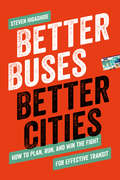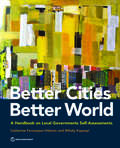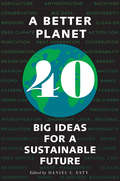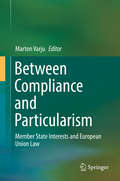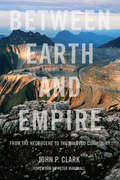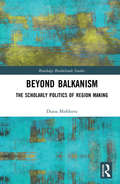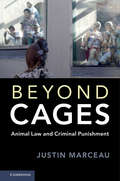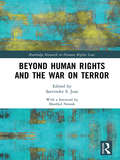- Table View
- List View
The Belt and Road Initiative: A Pathway towards Inclusive Globalization (China Perspectives)
by Liu WeidongThe Belt and Road Initiative (hereafter BRI) of China has attracted worldwide attention and participation, causing a lot of debate over its implications for international society. Although it is still in a budding stage, the BRI seems to afford a framework for an increasing number of countries to explore jointly new international economic governance mechanisms and offer significant opportunities for them to cope jointly with global challenges. Taking a globalization perspective and tracking the ancient silk roads, this book tries to examine the general context in which the BRI is raised and implemented, arguing that this Chinese initiative, instead of replacing existing international cooperation mechanisms, is a call for the reform and development of neoliberal globalization and will open up a new era of inclusive globalization. Inclusive globalization is neither an overturning nor a simple continuation of neoliberal globalization but rather a proposal capable of addressing the problems of existing globalization. The difference between them lies in the fact that globalization cannot only serve the "spatial fix" of capital but also has to meet the needs of living people. The book also addresses a number of major issues on building the Belt and Road and contains Chinese media’s interviews with the author on various BRI issues. Given the author has been intensively involved in the study of and planning for the BRI, the book offers a valuable academic insight into this Chinese initiative.
The Belt and Road Initiative and the Global Economy: Volume I – Trade and Economic Development
by John JoshuaThis two-volume work provides a comprehensive overview of the Belt and Road Initiative, examining its impact on economic growth, trade, financial systems and international relations. Weaving theory with real-world examples, Joshua makes an important contribution to the understanding of how the Global Economy is being shaped through these developments.In this first volume, Joshua focuses on the implications of different economic policies on trade and economic development. In addition, this volume reviews the history of the Belt and Road Initiative and analyses the needed infrastructure to enhance economic development and promote both regional and international trade.
The Belt and Road Initiative and the Global Economy: Volume II – The Changing International Financial System and Implications
by John JoshuaThis two-volume work provides a comprehensive overview of the Belt and Road Initiative, examining its impact on economic growth, trade, financial systems and international relations. Weaving theory with real-world examples, Joshua makes an important contribution to the understanding of how the Global Economy is being shaped through these developments.In this second volume, Joshua focuses on the operation of the international monetary system and the effects of the Belt and Road Initiative on both China's domestic economy and the Global Economy. In addition, this volume addresses the consequences of economic growth on the environment and international relations.
The Belt and Road Initiative: Key Concepts
by Huping ShangThis book introduces the “Belt and Road” in its entirety, including what it is, what it aims to do, what it can do and how. This book can serve as a helpful resource for the general public, it can improve their understanding about the “Belt and Road” and its relative economics, policy, culture and so on. Also, this book is good reading for academics, as well as students of public management, politics, finance and economics. The “Belt and Road” advances a whole complementary set of new ideas on international cooperation. Conforming to the principles of peace and cooperation, openness and inclusiveness, mutual learning and mutual benefit, it stipulates policy coordination, facilitates connectivity, unimpeded trade, financial integration and people-to-people bonds as the five major contents, and promotes practical cooperation in all fields. It also works to build an open and win-win regional community featuring mutual political trust, economic integration and cultural inclusiveness.
Bending the Rules: Procedural Politicking in the Bureaucracy
by Rachel Augustine PotterWho determines the fuel standards for our cars? What about whether Plan B, the morning-after pill, is sold at the local pharmacy? Many people assume such important and controversial policy decisions originate in the halls of Congress. But the choreographed actions of Congress and the president account for only a small portion of the laws created in the United States. By some estimates, more than ninety percent of law is created by administrative rules issued by federal agencies like the Environmental Protection Agency and the Department of Health and Human Services, where unelected bureaucrats with particular policy goals and preferences respond to the incentives created by a complex, procedure-bound rulemaking process. With Bending the Rules, Rachel Augustine Potter shows that rulemaking is not the rote administrative activity it is commonly imagined to be but rather an intensely political activity in its own right. Because rulemaking occurs in a separation of powers system, bureaucrats are not free to implement their preferred policies unimpeded: the president, Congress, and the courts can all get involved in the process, often at the bidding of affected interest groups. However, rather than capitulating to demands, bureaucrats routinely employ “procedural politicking,” using their deep knowledge of the process to strategically insulate their proposals from political scrutiny and interference. Tracing the rulemaking process from when an agency first begins working on a rule to when it completes that regulatory action, Potter shows how bureaucrats use procedures to resist interference from Congress, the President, and the courts at each stage of the process. This exercise reveals that unelected bureaucrats wield considerable influence over the direction of public policy in the United States.
Bending Toward Justice: The Birmingham Church Bombing That Changed the Course of Civil Rights
by Doug Jones Greg TrumanThe story of the decades-long fight to bring justice to the victims of the 16th Street Baptist Church bombing, culminating in Sen. Doug Jones' prosecution of the last living bombers. On September 15, 1963, the 16th Street Baptist Church in Birmingham, Alabama was bombed. The blast killed four young girls and injured twenty-two others. The FBI suspected four particularly radical Ku Klux Klan members. Yet due to reluctant witnesses, a lack of physical evidence, and pervasive racial prejudice the case was closed without any indictments.But as Martin Luther King, Jr. famously expressed it, "the arc of the moral universe is long, but it bends toward justice." Years later, Alabama Attorney General William Baxley reopened the case, ultimately convicting one of the bombers in 1977. Another suspect passed away in 1994, and US Attorney Doug Jones tried and convicted the final two in 2001 and 2002, representing the correction of an outrageous miscarriage of justice nearly forty years in the making. Jones himself went on to win election as Alabama’s first Democratic Senator since 1992 in a dramatic race against Republican challenger Roy Moore.Bending Toward Justice is a dramatic and compulsively readable account of a key moment in our long national struggle for equality, related by an author who played a major role in these events. A distinguished work of legal and personal history, the book is destined to take its place as a canonical civil rights history.
Beneath the Tamarind Tree: A Story of Courage, Family, and the Lost Schoolgirls of Boko Haram
by Isha Sesay“It is no accident that the places in the world where we see the most instability are those in which the rights of women and girls are denied. Isha Sesay’s indispensable and gripping account of the brutal abduction of Nigerian schoolgirls by Boko Haram terrorists provides a stark reminder of the great unfinished business of the 21st century: equality for girls and women around the world.”— Hillary Rodham ClintonThe first definitive account of the lost girls of Boko Haram and why their story still matters—by celebrated international journalist Isha Sesay.In the early morning of April 14, 2014, the militant Islamic group Boko Haram violently burst into the small town of Chibok, Nigeria, and abducted 276 girls from their school dorm rooms. From poor families, these girls were determined to make better lives for themselves, but pursuing an education made them targets, resulting in one of the most high-profile abductions in modern history. While the Chibok kidnapping made international headlines, and prompted the #BringBackOurGirls movement, many unanswered questions surrounding that fateful night remain about the girls’ experiences in captivity, and where many of them are today. In Beneath the Tamarind Tree, Isha Sesay tells this story as no one else can. Originally from Sierra Leone, Sesay led CNN’s Africa reporting for more than a decade, and she was on the front lines when this story broke. With unprecedented access to a group of girls who made it home, she follows the journeys of Priscilla, Saa, and Dorcas in an uplifting tale of sisterhood and survival. Sesay delves into the Nigerian government’s inadequate response to the kidnapping, exposes the hierarchy of how the news gets covered, and synthesizes crucial lessons about global national security. She also reminds us of the personal sacrifice required of journalists to bring us the truth at a time of growing mistrust of the media. Beneath the Tamarind Tree is a gripping read and a story of resilience with a soaring message of hope at its core, reminding us of the ever-present truth that progress for all of us hinges on unleashing the potential of women.
Benedetto Croce and the Birth of the Italian Republic, 1943–1952 (Toronto Italian Studies)
by Fabio RiziAs president of the Italian Liberal Party, Benedetto Croce was one of the most influential intellectuals involved in Italian public affairs after the fall of Mussolini. Placing Croce at the centre of historical events between 1943 and 1952, this book details his participation in Italy’s political life, and his major contributions to the rebirth of Italian democracy. Drawing on a great amount of primary material, including Croce’s political speeches, correspondences, diaries, and official documents from post-war Italy, this book illuminates the dynamic and progressive nature of Croce’s liberalism and the shortcomings of the old Liberal leaders. Providing a year-by-year account of Croce’s initiatives, author Fabio Fernando Rizi fills the gap in Croce’s biography, covering aspects of his public life often neglected, misinterpreted, or altogether ignored, and restores his standing among the founding fathers of modern Italy.
Beratung und Digitalisierung: Zwischen Euphorie und Skepsis (Soziale Arbeit als Wohlfahrtsproduktion #15)
by Stephan Rietmann Maik Sawatzki Mathias BergDigitalisierung ist mit tiefgehenden Änderungen sozialer, psychologischer und kultureller Gewohnheiten verbunden. Dies betrifft beispielsweise die Art, wie soziale Beziehungen gestaltet werden oder wie wir als Person über uns selbst denken, wenn ein Algorithmus mehr Kenntnis von uns hat, als wir selbst. Dieser explorative Sammelband enthält fachwissenschaftliche und praxisorientierte Beiträge, die Chancen und Risiken von Digitalisierung interdisziplinär beleuchten und der Leserschaft wertvolle Impulse zur Reflektion für die eigene Beratungspraxis bieten.
The Bereavement of Martyred Palestinian Children: Gendered, Religious and National Perspectives (Palgrave Studies in Cultural Heritage and Conflict)
by Maram MasarwiThis book examines the phenomenon of individual and collective bereavement in Palestinian society. It seeks to explore the boundaries of the discourse of bereavement and commemoration in that society through the interactive relations between religion, nationality and gender, and the ways these influence the shaping of the mourning process for Palestinian parents who have lost their children in the second (al-Aqsa) Intifada. Over the course of the book’s five chapters, Maram Masarwi scrutinizes how these components have shaped the differences in behavior between bereaved fathers and bereaved mothers: what characterizes these differences, how they are expressed, and how they have managed to shape the characteristics of the experience of Palestinian bereavement.
The Berlin Mission: The American Who Resisted Nazi Germany from Within
by Richard BreitmanAn unknown story of an unlikely hero--the US consul who best analyzed the threat posed by Nazi Germany and predicted the horrors to comeIn 1929, Raymond Geist went to Berlin as a consul and handled visas for emigrants to the US. Just before Hitler came to power, Geist expedited the exit of Albert Einstein. Once the Nazis began to oppress Jews and others, Geist's role became vitally important. It was Geist who extricated Sigmund Freud from Vienna and Geist who understood the scale and urgency of the humanitarian crisis.Even while hiding his own homosexual relationship with a German, Geist fearlessly challenged the Nazi police state whenever it abused Americans in Germany or threatened US interests. He made greater use of a restrictive US immigration quota and secured exit visas for hundreds of unaccompanied children. All the while, he maintained a working relationship with high Nazi officials such as Heinrich Himmler, Reinhard Heydrich, and Hermann Göring.While US ambassadors and consuls general cycled in and out, the indispensable Geist remained in Berlin for a decade. An invaluable analyst and problem solver, he was the first American official to warn explicitly that what lay ahead for Germany's Jews was what would become known as the Holocaust.
Berlusconi ‘The Diplomat’: Populism and Foreign Policy in Italy
by Emidio Diodato Federico NigliaThis book analyses the foreign policy of Silvio Berlusconi, Italian media tycoon and politician who served as Prime Minister of Italy in four governments. The authors examine the Italian position in the international arena and its foreign policy tradition, as well as Berlusconi’s general political stance, Berlusconi’s foreign policy strategies and the impact of those strategies in Italy. Given that Berlusconi is considered a populist leader, the volume considers his foreign policy as an instance of populist foreign policy – an understudied but increasingly relevant topic.
The Best of Matt 2019
by Matt PritchettThe best of the best! Award-winning cartoonist Matt looks back at the last 12 months in his own hilariously entertaining style - the perfect Christmas gift for everyone!'Matt is an Adorable Genius' Jilly CooperWhether you want to laugh or cry about the last twelve months, Matt gives a brilliantly funny take on the world. From Brexit to business, Trump to transport woes, our obsession with the weather to Royal babies, Matt nails it every single time with just the right visual joke. There is no doubt: Matt definitely makes the world a happier place!'So much greater than his nearest rivals it's almost embarrassing' Stephen Fry
The Best of Matt 2019
by Matt PritchettWhether you want to laugh or cry about the last twelve months, Matt gives a brilliantly funny take on the world. From Brexit to business, Trump to transport woes, our obsession with the weather to Royal babies, Matt nails it every single time with just the right visual joke. There is no doubt: Matt definitely makes the world a happier place!
The Best People: Trump's Cabinet and the Siege on Washington
by Alexander NazaryanAn engrossing look at the Trump cabinet: the scandals, the incompetence, the assault on the federal government, the bungled attempts to impose order on an administration lost in a chaos of its own making.Donald Trump promised a return to national greatness, but each day of his presidency seems to bring a new crisis, a deepening sense of national unease. Why, and how, has he failed his supporters? And how has he, on occasion, bested his detractors? The Best People takes complete measure of the Trump administration, to grasp with clarity the president and his intentions, and how those intentions are being carried out-or subverted-by the people he has hired. Alexander Nazaryan argues that the "assault on the administrative state" promised by Steve Bannon in early 2017 never came. What the American people got instead was Wilbur Ross hauling his tennis pro to confirmation hearing preparations; Scott Pruitt running away from rattlesnakes; Reince Priebus enduring insults from junior White House staffers. And yet, bungling as Trump's cabinet members have been, they have managed to either damage or arrest many of the gears that make government run. They have given away public lands to oil companies and allowed corporate lobbyists to make decisions about what is best for the American people, and have done it all while flying on private jets and dining at the finest restaurants, at taxpayers' expense. Meticulously reported and enthrallingly told, The Best People takes readers inside the federal government under Trump's control, a government assailed by the very people charged to lead it, a government awash in confusion and corruption.
Betrayal in Berlin: The True Story of the Cold War's Most Audacious Espionage Operation
by Steve VogelThe astonishing true story of the Berlin Tunnel, one of the West’s greatest espionage operations of the Cold War—and the dangerous Soviet mole who betrayed it.Its code name was “Operation Gold,” a wildly audacious CIA plan to construct a clandestine tunnel into East Berlin to tap into critical KGB and Soviet military telecommunication lines. The tunnel, crossing the border between the American and Soviet sectors, would have to be 1,500 feet (the length of the Empire State Building) with state-of-the-art equipment, built and operated literally under the feet of their Cold War adversaries. Success would provide the CIA and the British Secret Intelligence Service access to a vast treasure of intelligence. Exposure might spark a dangerous confrontation with the Soviets. Yet as the Allies were burrowing into the German soil, a traitor, code-named Agent Diamond by his Soviet handlers, was burrowing into the operation itself. . . Betrayal in Berlin is Steve Vogel’s heart pounding account of the operation. He vividly recreates post-war Berlin, a scarred, shadowy snake pit with thousands of spies and innumerable cover stories. It is also the most vivid account of George Blake, perhaps the most damaging mole of the Cold War. Drawing upon years of archival research, secret documents, and rare interviews with Blake himself, Vogel has crafted a true-life spy story as thrilling as the novels of John le Carré and Len Deighton.Betrayal in Berlin includes 24 photos and two maps.
The Betrayal of Liberal Economics: Volume I: How Economics Betrayed Us
by Amos WitztumThe presumed sovereignty of individuals and the facilitating powers of the markets have generated a universal and ethically neutral conception of both social and economic organisation. This ground-breaking text re-examines the purpose of society and the role of economics in it, arguing that the absence of a beneficial natural order calls for the role of the collective in social and economic life to be revisited. Drawing on some key figures marking milestones in the evolution of social and economic thinking, the author offers a critique of mainstream economics as a way of thinking and as a provider of guiding principles for economic and social organisation. Volume I introduces the reader to the emergence of natural order; considers the internal logic of economics and how it managed to be so persuasive in its recommendation for competitive interactions to govern all aspects of social life in all societies and across them; demonstrates that the economic conception of an order which solves society’s economic problem is, in fact, an impossibility that turns the natural phenomenon of markets into a problem rather than an ideal; and, addresses the other apparent appeal of markets: their association with the ideas of freedom and justice. This is a bold and foundational new work that offers an original and innovative perspective on economics and its challenges, addressing core areas such as behavioural economics, evolutionary game theory and links between social sciences (anthropology, philosophy) and neurosciences.”
Better Buses, Better Cities: How to Plan, Run, and Win the Fight for Effective Transit
by Steven HigashideImagine a bus system that is fast, frequent, and reliable—what would that change about your city?Buses can and should be the cornerstone of urban transportation. They offer affordable mobility and can connect citizens with every aspect of their lives. But in the US, they have long been an afterthought in budgeting and planning. With a compelling narrative and actionable steps, Better Buses, Better Cities inspires us to fix the bus.Transit expert Steven Higashide shows us what a successful bus system looks like with real-world stories of reform—such as Houston redrawing its bus network overnight, Boston making room on its streets to put buses first, and Indianapolis winning better bus service on Election Day. Higashide shows how to marshal the public in support of better buses and how new technologies can keep buses on time and make complex transit systems understandable.Higashide argues that better bus systems will create better cities for all citizens. The consequences of subpar transit service fall most heavily on vulnerable members of society. Transit systems should be planned to be inclusive and provide better service for all. These are difficult tasks that require institutional culture shifts; doing all of them requires resilient organizations and transformational leadership.Better bus service is key to making our cities better for all citizens. Better Buses, Better Cities describes how decision-makers, philanthropists, activists, and public agency leaders can work together to make the bus a win in any city.
Better Cities, Better World: A Handbook on Local Governments Self-Assessments
by Catherine Farvacque-Vitkovic Mihaly KopanyiThe planet is becoming increasingly urban. In many ways, the urbanization wave and the unprecedented urban growth of the past 20 years have created a sense of urgency and an impetus for change. Some 54 percent of the world population—3.9 billion people—lives in urban areas today; thus, it has become clear that “business as usual†? is no longer possible. This new configuration places great expectations on local governments. While central governments are subject to instability and political changes, local governments are seen as more inclined to stay the course. Because they are closer to the people, the voice of the people is more clearly heard for a truly democratic debate over the choice of neighborhood investments and city-wide policies and programs, as well as the decision process on the use of public funds and taxpayers’ money. In a context of skewed financial resources and complex urban challenges—which range from the provision of basic traditional municipal services to the “newer†? agenda of social inclusion, economic development, city branding, emergency response, smart technologies, and green investment—more cities are searching for more effective and innovative ways to deal with new and old problems. Better Cities, Better World: A Handbook on Local Governments Self-Assessments is at the heart of this debate. It recognizes the complex past, current, and future challenges that cities face and outlines a bottom-line, no-nonsense framework for data-based policy dialogue and action; a common language that, for the first time, helps connect the dots between public investments programming (Urban Audit/Self-Assessment) and financing (Municipal Finances Self-Assessment). It helps address two key questions, too often bypassed when it comes to municipal infrastructure and services financing: Are we doing the right things? Are we doing things right? Better Cities, Better World: A Handbook on Local Governments Self-Assessments offers a bit of everything for everyone. • Central governments will be attracted by the purposefulness and clarity of these tools, their impact on local government capacity and performance building, and how they improve the implementation of transformative actions for policy change. • City leaders and policy makers will find the sections on objectives and content instructive and informative, with each issue placed in its context, and strong connections between data and municipal action. • Municipal staff in charge of day-to-day management will find that the sections on tasks and the detailed step-by-step walk through the process give them the pragmatic knowhow that they need. • Cities’ partners—such as bilateral and multilateral agencies, banks and funds, utility companies, civil society, and private operators—will find the foundations for more effective collaborative partnerships.
A Better Planet: Forty Big Ideas for a Sustainable Future
by Daniel C. Esty Ingrid C. BurkeA practical, bipartisan call to action from the world’s leading thinkers on the environment and sustainability Sustainability has emerged as a global priority over the past several years. The 2015 Paris Agreement on climate change and the adoption of the seventeen Sustainable Development Goals through the United Nations have highlighted the need to address critical challenges such as the buildup of greenhouse gases in the atmosphere, water shortages, and air pollution. But in the United States, partisan divides, regional disputes, and deep disagreements over core principles have made it nearly impossible to chart a course toward a sustainable future. This timely new book, edited by celebrated scholar Daniel C. Esty, offers fresh thinking and forward-looking solutions from environmental thought leaders across the political spectrum. The book’s forty essays cover such subjects as ecology, environmental justice, Big Data, public health, and climate change, all with an emphasis on sustainability. The book focuses on moving toward sustainability through actionable, bipartisan approaches based on rigorous analytical research.
Between Compliance and Particularism: Member State Interests and European Union Law
by Marton VarjuThe book examines how the interests of the member states, which provide the primary driving force for developments in European integration, are internalised and addressed by the law of the European Union. In this context, member state interests are taken to mean the policy considerations, economic calculations, local socio-cultural factors, and the raw expressions of political will which shape EU policies and determine member state responses to the obligations arising from those policies. The book primarily explores the junctions and disjunctions between member state interests defined in such a manner and EU law, where the latter expresses either an obligation for the member states to comply with common policies or an acceptance of member state particularism under the common EU framework.
Between Earth and Empire: From the Necrocene to the Beloved Community
by John P. ClarkBetween Earth and Empire focuses on the crucial position of humanity at the present moment in Earth History. We have left the Cenozoic, the "new period of life," and are now in the midst of the Necrocene, a period of mass extinction and reversal of the course of evolution of life on Earth. It is argued that an effective response to global crisis requires attention to all major spheres of social determination, including the social institutional structure, the social ideology, the social imaginary, and the social ethos. In this wide-ranging and ruthlessly compassionate critique, John P. Clark explores examples of significant progress in this direction, including the Zapatista movement in Chiapas, the Democratic Autonomy Movement in Rojava, indigenous movements in defense of the commons, the solidarity economy movement, and efforts to create liberated base communities and affinity groups within anarchism and other radical social movements. In the end, the book presents a vision of hope for social and ecological regeneration through the rebirth of a libertarian and communitarian social imaginary, and the flourishing of a free cooperative community globally.
Beyond Balkanism: The Scholarly Politics of Region Making (Routledge Borderlands Studies)
by Diana MishkovaIn recent years, western discourse about the Balkans, or “balkanism,” has risen in prominence. Characteristically, this strand of research sidelines the academic input in the production of western representations and Balkan self-understanding. Looking at the Balkans from the vantage point of “balkanism” has therefore contributed to its further marginalization as an object of research and the evisceration of its agency. This book reverses the perspective and looks at the Balkans primarily inside-out, from within the Balkans towards its “self” and the outside world, where the west is important but not the sole referent. The book unravels attempts at regional identity-building and construction of regional discourses across various generations and academic subcultures, with the aim of reconstructing the conceptualizations of the Balkans that have emerged from academically embedded discursive practices and political usages. It thus seeks to reinstate the subjectivity of “the Balkans” and the responsibility of the Balkan intellectual elites for the concept and the images it conveys. The book then looks beyond the Balkans, inviting us to rethink the relationship between national and transnational (self-)representation and the communication between local and exogenous – Western, Central and Eastern European – concepts and definitions more generally. It thus contributes to the ongoing debates related to the creation of space and historical regions, which feed into rethinking the premises of the “new area studies.” Beyond Balkanism: The Scholarly Politics of Region Making will interest researchers and students of transnationalism, politics, historical geography, border and area studies.
Beyond Cages: Animal Law and Criminal Punishment
by Justin MarceauFor all the diversity of views within the animal protection movement, there is a surprising consensus about the need for more severe criminal justice interventions against animal abusers. More prosecutions and longer sentences, it is argued, will advance the status of animals in law and society. Breaking from this mold, Professor Justin Marceau demonstrates that a focus on 'carceral animal law' puts the animal rights movement at odds with other social justice movements, and may be bad for humans and animals alike. Animal protection efforts need to move beyond cages and towards systemic solutions if the movement hopes to be true to its own defining ethos of increased empathy and resistance to social oppression. Providing new insights into how the lessons of criminal justice reform should be imported into the animal abuse context, Beyond Cages is a valuable contribution to the literature on animal welfare and animal rights law.
Beyond Human Rights and the War on Terror (Routledge Research in Human Rights Law)
by Satvinder S. JussThis edited collection provides a comprehensive, insightful, and detailed study of a vital area of public policy debate as it is currently occurring in countries across the world from India to South Africa and the United Kingdom to Australia. Bringing together academics and experts from a variety of jurisdictions, it reflects upon the impact on human rights of the application of more than a decade of the "War on Terror" as enunciated soon after 9/11. The volume identifies and critically examines the principal and enduring resonances of the concept of the "War on Terror". The examination covers not only the obvious impacts but also the more insidious and enduring changes within domestic laws. The rationale for this collection is therefore not just to plot how the "War on Terror" has operated within the folds of the cloak of liberal democracy, but how they render that cloak ragged, especially in the sight of those sections of society who pay the heaviest price in terms of their human rights. This book engages with the public policy strand of the last decade that has arguably most shaped perceptions of human rights and engendered debates about their worth and meaning. It will be of interest to researchers, academics, practitioners, and students in the fields of human rights law, criminal justice, criminology, politics, and international studies.
